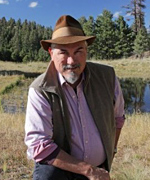— Alan Dulaney
 There were a few moments this dry winter when I dreamed that clear thinking had magically enlightened the Arizona Legislature, and that in the arena of water this year, they would do no harm. Then each time I woke up and discovered that the flood of light was from a sky with no clouds.
There were a few moments this dry winter when I dreamed that clear thinking had magically enlightened the Arizona Legislature, and that in the arena of water this year, they would do no harm. Then each time I woke up and discovered that the flood of light was from a sky with no clouds.
Determined backlash from the community of Registered Geologists (and many AHS members are RGs) ameliorated the intent of HB 2613 to eliminate the RG designation and sharply curtail the oversight of the Board of Technical Registration. The term “Registered Geologist” survives, as does regulation by the Board. But they do not retain the full sweep of regulatory authority that they previously had, because a sentence was added: “A geologist may engage in a geological practice without being registered under this chapter.” So who is a geologist and who isn’t, and by what criteria? This language muddies the waters. HB 2613 was passed by the House and transferred to the Senate, where it passed committee and, as of this writing, awaits action by the Committee of the Whole (a full Senate vote). Once passed, the Governor will likely sign it, since the ideological impetus for this bill came from his office.
SB 1268 was discussed in the February column. This bill would roll back legislation passed in 2007 that allowed rural Arizona counties and cities, prior to plat approval for subdivisions, to require a Water Supply Report from ADWR that determined the water supply to be physically, legally, and continuously available for 100 years. Only Yuma and Cochise Counties (and Clarkdale and Patagonia) adopted the requirement, but it greatly strengthened the Adequate Water Supply program. However, in Arizona, if developers hit an obstacle they don’t like, they go straight to the Legislature. SB 1268 was introduced for one 7,000 home subdivision in Sierra Vista. It passed the Senate, but the House began talking about how it was actually bad water policy for the state as a whole. A couple of namby-pamby amendments later, such talk disappeared. The House passed it, and it went back to the Senate where it is likely to pass. Only the Governor’s veto can stop this piece of legislation now. The Governor has talked of the importance of good water policy for Arizona, as reliable water supplies are critical to economic development. We shall see if he can walk the walk.
Hard on the heels of SB 1268, the Senator from Cochise County introduced a strike-all bill with similar intent: SB 1400. This bill uses different language to accomplish the same goal, which is to remove the authority of counties and cities in rural Arizona to invoke the Adequate Water Supply rules to insure reliable water for subdivisions. The attack is from a different direction, requiring constant unanimous re-approvals to maintain the authority. Developers support this version too. Yuma County doesn’t want this rollback of their authority, but the Legislature rarely considers what counties and cities want in these matters. SB 1400 has passed the Senate, and gone over to the House, where it awaits action by the Committee of the Whole (the full House). Because SB 1268 went through, it is likely that this bill will pass as well. Governor Ducey should veto SB 1400 with the same pen that he (hopefully) uses to veto SB 1268.
By weakening water policy in rural Arizona, both SB 1268 and 1400 weaken water policy everywhere in the state. This is not a good thing when Arizona wants to point out how its water management concepts and programs are so much better than in surrounding states, how we have protected our water resources, how forward thinking years ago is now ferrying Arizona through a major drought, maintaining its economic viability. We can only dream that enlightenment will finally prevail.